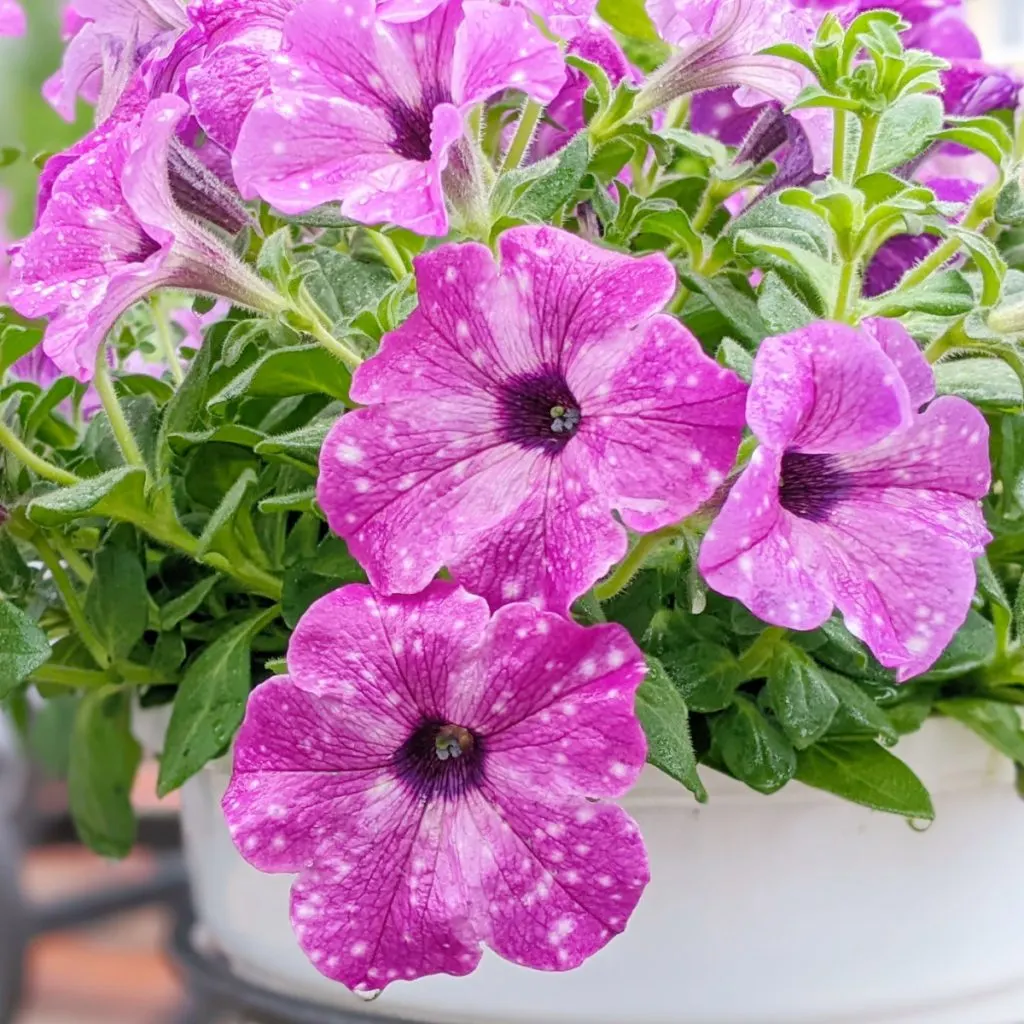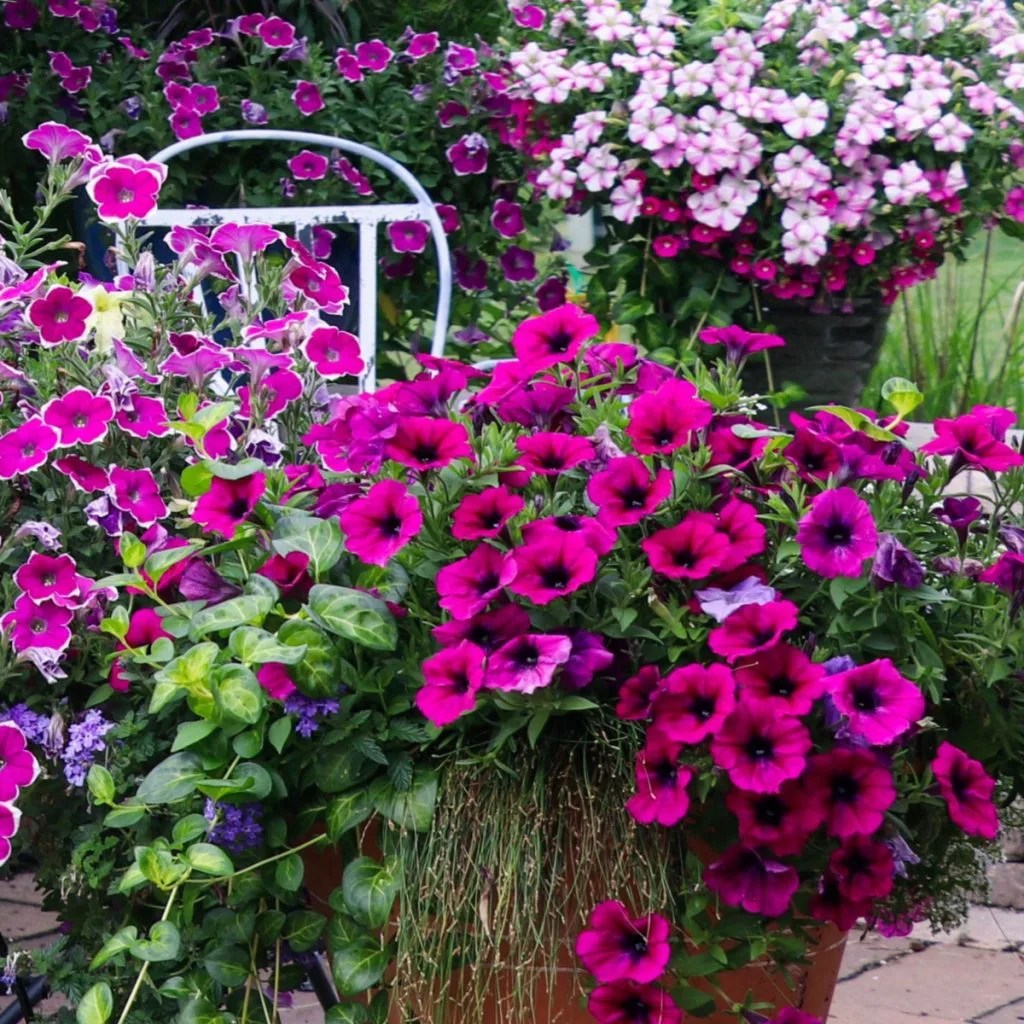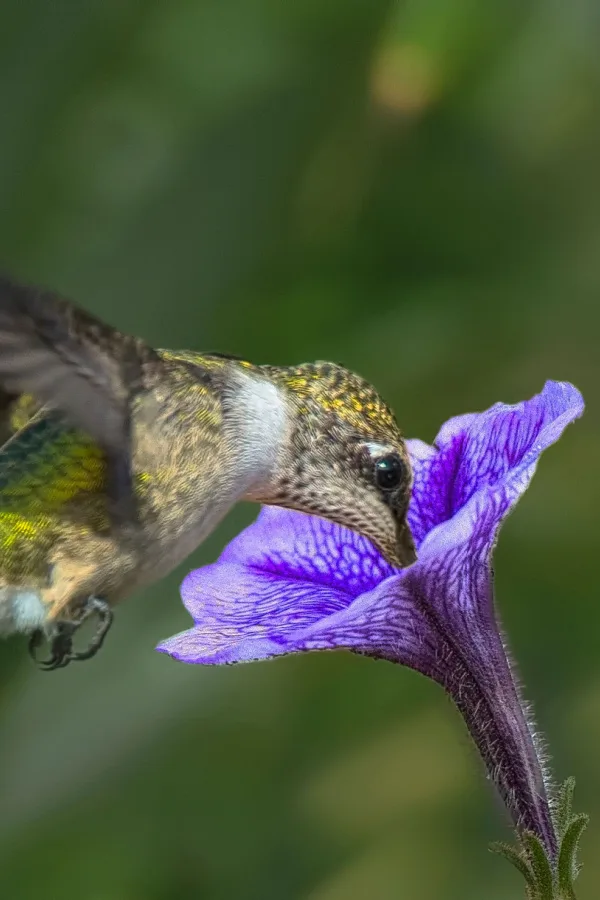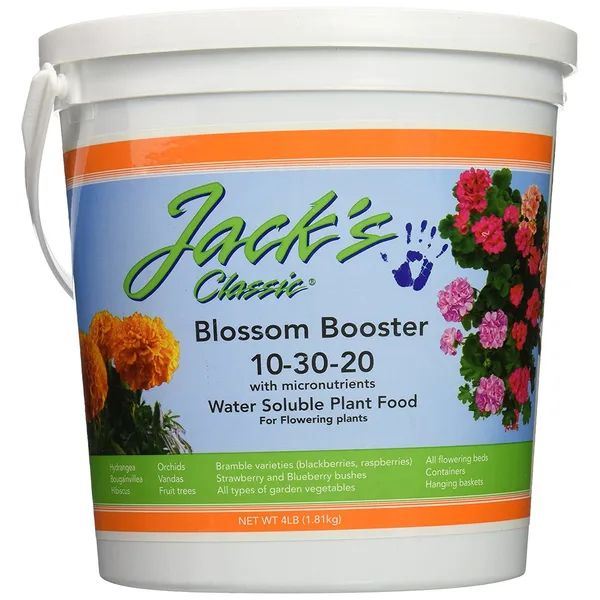Wondering how to fertilize your petunias this summer to keep them healthy and blooming bigger and longer than ever?
Petunias not only produce massive amounts of bright, funnel-shaped blooms, they do so in a wide range of colors. And with new types and blooming color combinations coming out with each passing year, the flowering annual has now become more popular than ever.
But if there is one common issue that many gardeners face with petunias, it’s getting their plants to stay flowering strong late all through summer and early fall. Although petunias are usually thriving and full of color in late spring and early summer, all too often, the plants show early signs of wear and tear as they begin to age.

More times than not, the issue isn’t with the plant. Nor is it from disease or pest issues. Instead, when petunias begin to slow their blooming and begin to fade, the problem can usually be traced back to a simple lack of available energy in the soil.
Giving Petunias The Nutrients They Need – How To Fertilize Petunias
Petunias require a lot of nutrients to power all of their bright, colorful blooms. Because of that, they can deplete even the best potting soil or flowerbed soil of those nutrients quite fast. And once it’s gone, it doesn’t take long for the foliage and pretty blooms to begin to suffer.
But when it comes to getting petunias to stay strong, healthy and continue to flower big – the real secret to success is feeding your plants the right mix of nutrients for blooming – and not just to green them up.
The good news is by simply providing your plants with the right dose and type of fertilizer on a consistent basis throughout the growing season, you can easily keep your petunias thriving. And in the process, have them blooming big right up until your first hard frost or freeze!

How To Fertilize Petunias – 2 Simple Secrets To Keep Petunias Blooming!
One thing is for sure, how, when, and what you fertilize your petunias with all make a big difference in just how well your plants perform all season long.
If you give petunias too much power all at once, it will actually harm the plants and their blooming potential. When annual flowers (and vegetable plants) get too much energy, they change their growth pattern. Instead of using it to produce more flowers, they use the energy to simply grow bigger.
Likewise, if they get too little energy, or have too much of a delay between feedings, they will also slow or stop blooming. Because of this, it’s important to supply your plants with a consistent but low dose of energy. Even more, it’s also vital to give it to them in a form they can easily and quickly absorb.
The good news is that with petunias, it’s easy to do this with two simple fertilizer feedings. One of which supplies a steady stream of nutrients to maintain vitality. The other then supplies petunias with all the power they need to keep flowering big!

Giving Petunias Slow & Steady Power – How To Fertilize Petunias
To maintain good foliage and health, petunias need a source of slow and steady power. Again, too much will simply make them grow big – and often outgrow their containers in the process. The first answer? Worm castings or a light dose of all purpose granular fertilizer applied to the base of the plants every month.
The nutrients in worm castings are pure and easy to absorb. This all natural fertilizer is great for powering steady growth and helping to keep the foliage strong. Product Affiliate Link: 100% Pure Organic Worm Castings Fertilizer
With 1/4 to 1/2 cup of castings applied every month to the surface, every time you water or it rains your petunias get a slow dose of nutrients trickling down to their roots. It really is the perfect way to give your plants the power they need to maintain their health.
For this low and slow fertilizing, you can also use a dry, granular fertilizer. The key here is to select a fertilizer that has a low but equal percentage of nitrogen, phosphorous and potassium (N-P-K). This will keep the growth of your plants manageable.
So what about fertilizing for blooms? For that, it’s all about giving your plants a regular dose of liquid fertilizer filled with the ingredients that make blooms explode!
Check Out & Listen To Our Podcast Below On Using Worm Castings To Power Plants!
Why Liquid Fertilizer Is The Best Choice For Powering Petunia Blooms!
Without a doubt, when it comes to energizing petunias and powering blooms, liquid fertilizing is the way to go. Liquid fertilizers are able to absorb into plants in two separate but powerful ways. And that double action is a huge help in keeping plants continually blooming!
When a liquid fertilizer is applied to the soil around a plant, it soaks down into the roots. Because it is in a liquid form, the roots are able to absorb it quickly. This allows the plant to use the power almost immediately.
But liquid fertilizers also absorb into a plant through its leaves and stems. As the liquid touches the foliage, it absorbs in through the cells of the plant. This provides an additional source of energy that doesn’t have to take time to come through the roots.
Another big benefit of using liquid fertilizers for blooming power is that with liquid power, you can easily adjust the level of strength. And that makes delivering the perfect dose of energy much easier. And when it comes to giving that perfect dose, it’s all about selecting a liquid fertilizer designed to power blooms!
Liquid Commercial Fertilizer – Fertilizing Petunias For Success
When looking for a liquid fertilizer to power your petunias, look for options that have larger amounts of phosphorous and potassium in the nitrogen-phosphorous-potassium (N-P-K) ratios listed on commercial fertilizers. This will help more with producing blooms than just plant growth.
Plants use nitrogen for growing strong stems and foliage. But it is phosphorous and potassium that power blooms. And by selecting a fertilizer that is higher in phosphorous and potassium versus nitrogen, you are providing your plants with just the right energy for more flowers.
Many fertilizers now designed for better blooming will have the words bloom and booster right on the package. Affiliate Link: Jack’s Bloom Booster 10-30-20
Once you have your fertilizer, the next key is to dilute it to one-half of the recommended dose. By weakening the solution, you keep the plant from getting too many nutrients all at once. This also allows you to give the plants a dose more often to keep a steady supply of energy.
For best results, when fertilizing with a commercial fertilizer, use at half-strength every seven to 10 days. This is the perfect balance of giving great nutrients with a low and steady method. With this little 2 step approach to fertilizing – your petunias will thank you with amazing blooms all season long!
One last note – don’t forget to remove those old blooms regularly too. By deadheading your petunia plant’s blooms as they die off, you will save valuable energy for your plants. Energy they can then use to power more blooms. See our article: How To Deadhead Petunias
This Is My Garden
Follow Our Facebook Page For Great Gardening Tips And Advice! This Is My Garden Facebook Page
This Is My Garden is a garden website created by gardeners, for gardeners. Jim and Mary Competti have been writing gardening, DIY and recipe articles and books and speaking for over 15 years from their 46 acre Ohio farm. They publish three articles every week, 52 weeks a year. Sign up today to follow via email, or follow along!

